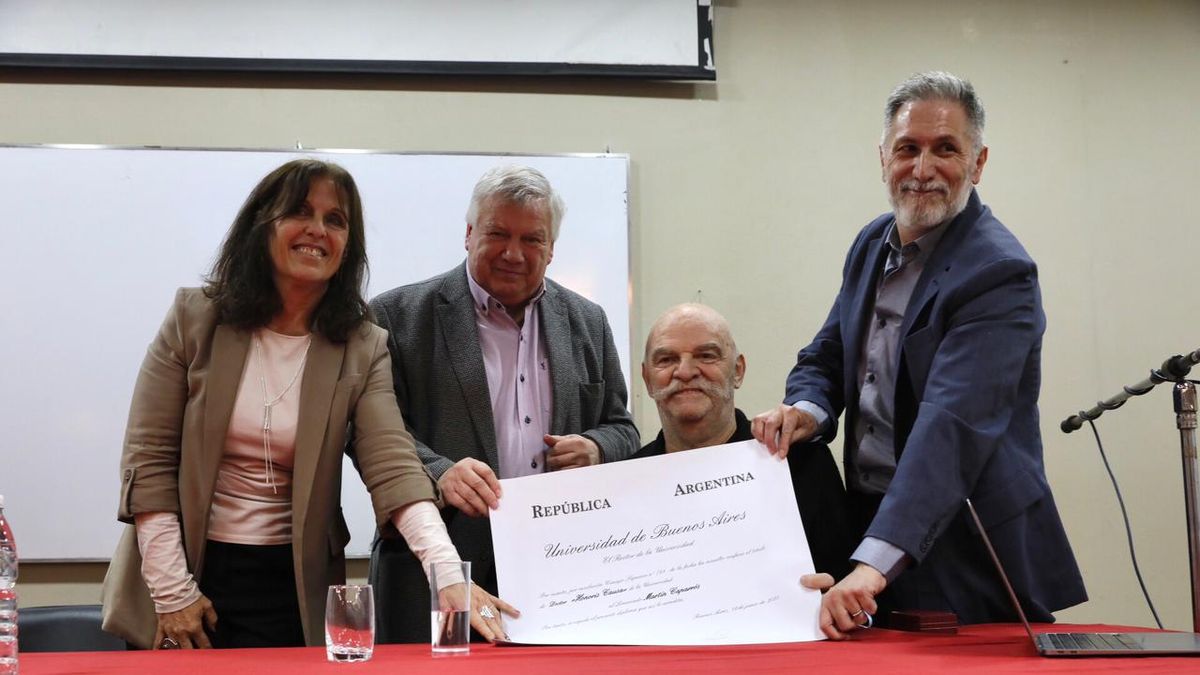The renowned writer and journalist Martín Caparrós received the maximum recognition of the University of Buenos Airesthat he gave him a Honoris Causa Doctoratereserved for people highlighted by contributions in their respective fields.
The writer has an extensive and outstanding career: he published more than 40 works, including novels, chronicles and essays, many of them translated into other languages. Among its most emblematic titles are The will (1997), The story (1999), The interior (2005), The living (Herralde Award, 2011), Hunger (2014), Ñamérica (Prix Roger Caillois, 2023) and First of all (2024).
The act was headed by the Rector Ricardo Gelpithe dean of the Faculty of Philosophy and Letters, Ricardo Manetti and the vice -dean, Graciela Morgade and was attended by the writer Daniel Guebel.
Martín Caparrós remembered his passage through the UBA and highlighted the prestige of the institution
During your speech, Caparrós He told his “personal” relationship with the UBA And he recalled that he began “on December 5, 1968, at about 9 in the morning, when I crossed the monumental doors of the National College to try his luck in his entrance exam.”
“I found my name at the University of Buenos Aires,” he said. “During all my childhood and adolescence they called me Mopi, or at school simply Caparrós. But in 1974, when I entered the Faculty of Philosophy and Letters with the curious purpose of studying History, I couldn’t continue presenting me as Mopi. My first name, Antonio, He was already taken: my father, Antonio Caparrós, had recovered his chair and was well known in the Faculty. I didn’t want to spend my life clarifying that it wasn’t him, so I decided to turn to my second name, Martín”
After starting his speech with this memory, he analyzed the present of the country and acknowledged that “it is difficult to measure a small personal success in a so ruined society“In that sense, he questioned:“ What are a few books, some scattered text here and there, in a country that, Among other things, every time reads less and worse? But despite everything, we have things”
“We have, among others, this University”, highlighted. “In the midst of disaster, The UBA has not fallen. A little over 50 years ago, when I entered, I was intervened by a military government and had about 100,000 students. Today, with many problems and under fire, he governs herself and has about 300,000”
The writer remarked that the UBA remains “despite all the efforts of the hate regime, the only Latin American university among the 100 best in the world” and remains “more than anything, a public and free institution.” In that line, he continued: “It is still a space of production and reproduction of knowledge of all kinds, but above all, it remains a reminder of what we try to be and perhaps we will once will be”, He concluded.
Source: Ambito
I am an author and journalist who has worked in the entertainment industry for over a decade. I currently work as a news editor at a major news website, and my focus is on covering the latest trends in entertainment. I also write occasional pieces for other outlets, and have authored two books about the entertainment industry.




